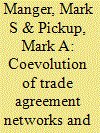| Srl | Item |
| 1 |
ID:
143299


|
|
|
|
|
| Summary/Abstract |
The proliferation of preferential trade agreements (PTAs) and the wave of democratization are among the most significant developments in international relations during the past three decades. The correlation between these is well noted. The causal link between these phenomena, however, remains unclear. On one hand, democracies have been found to be more likely to join PTAs. On the other hand, trade agreements should foster democratization because they undermine the ability of governments to distribute rents to maintain an autocratic regime. If PTAs and democracy coevolve through a selection and a contagion effect, then conventional statistical techniques can produce wholly misleading results. This article presents a new approach based on recent advancements in longitudinal network analysis. Our findings confirm that historically, democratization indeed made states more likely to sign PTAs, but that trade agreements also encourage the democratization of a country, in particular if the PTA partners are themselves democracies.
|
|
|
|
|
|
|
|
|
|
|
|
|
|
|
|
| 2 |
ID:
115204


|
|
|
|
|
| Publication |
2012.
|
| Summary/Abstract |
Bilateral trade agreements have proliferated rapidly within the last two decades, growing into a dense network of multiple ties between countries. The spread of preferential trade agreements (PTAs), however, is not uniform: some countries have signed a multitude of deals, while others remain much less involved. This article presents a longitudinal network analysis method to analyze the patterns of the formation of trade agreements, based on the mutual codetermination of network structure and agreement formation. The findings suggest that PTAs spread endogenously because of structural arbitrage effects in the network, and that they establish a hierarchy among countries. Rich countries form ties with each other and middle-income countries, who themselves create a horizontal layer of PTAs, but least-developed countries are left behind and do not form many ties. Supplanting the multilateral trade regime with preferential agreements therefore creates a system of highly asymmetrical relationships of weaker spokes around a few hubs.
|
|
|
|
|
|
|
|
|
|
|
|
|
|
|
|